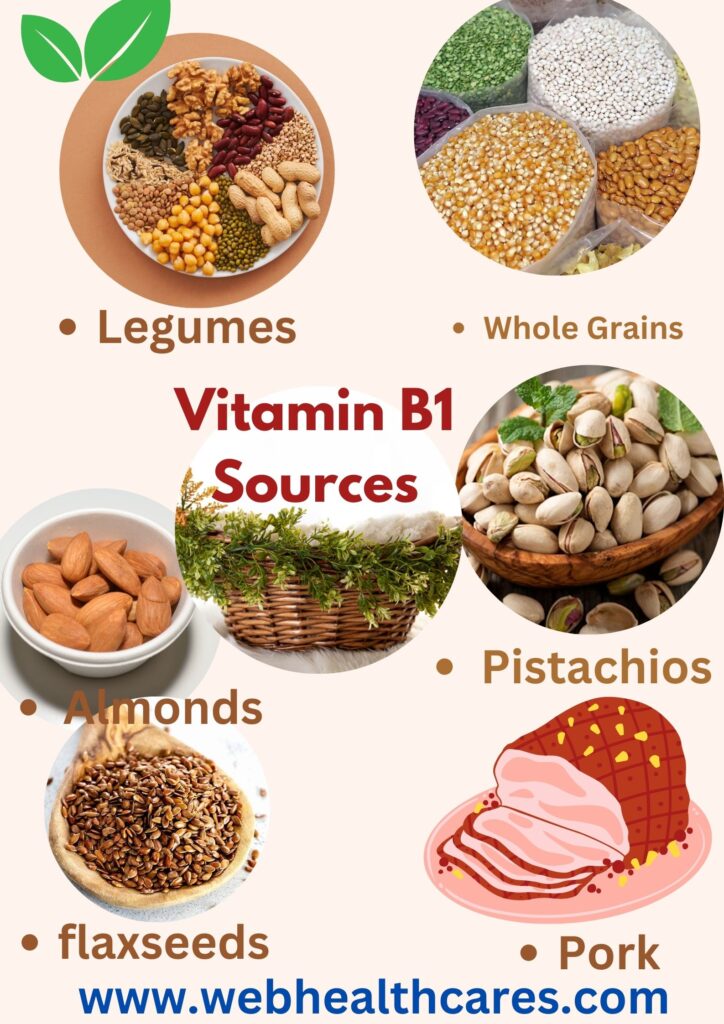- Vitamin B1, also known as thiamine, is a water-soluble vitamin that is essential for the proper functioning of the body.
- Vit. B1 is a member of the B-complex group of vitamins and important for energy metabolism, nervous system function, and cardiovascular health.
- In this article, we will explore the various aspects of vitamin B1, including its functions, sources, deficiency, and supplementation.
Benefits and function
- Convert carbohydrates into energy.
- Maintain a healthy cardiovascular system.
- Maintain the health of the brain and nervous system.
- Important for Digestive Health.
- Vitamin B1(Thiamine) has antioxidant properties, helping to neutralize harmful free radicals and reduce oxidative stress.
Daily Requirement of vitamin B1
The recommended daily intake of vitamin B1 varies based on age, and sex. Generally daily requirement of Vit. B1 :-
- In Adult Men:- 1.2 mg per day recommended dietary allowance (RDA).
- In Adult females:- 1.1 mg per day recommended dietary allowance (RDA).
Rich Sources of Vitamin B1
- Whole Grains:- Whole grains like brown rice, oats, quinoa, and whole wheat are excellent sources of vitamin B1.
- Legumes:- Legumes such as lentils, chickpeas, black beans, and soybeans are great plant-based protein sources and they have significant amounts of vitamin B1.
- Pork:- Pork, particularly lean cuts like pork tenderloin, is a notable animal-based source of vitamin B1 and also a good source of high-quality protein.
- Nuts and Seeds:- Almonds, pistachios, sunflower seeds, and flaxseeds are rich in vitamin B1.
- Fish:- such as Tuna, trout, and salmon are top choices for thiamine and omega-3 fatty acids.
- Fortified Foods:- Fortified foods, such as breakfast cereals and bread good choice for B1.
- Many manufacturers add thiamine and other vitamins to their products to enhance their nutritional value.
- It’s important to read labels carefully and choose products with minimal added sugars and artificial additives.
Deficiency Disorder
Vitamin B1 deficiency can lead to a condition called Beriberi, which has neurological, cardiovascular, and muscular symptoms, and ICD-10 code E51.9 is used for Beriberi.
- There are two main types of beriberi:-
- Dry beriberi.
- Wet beriberi.
- 1. Dry beriberi Symptoms:- Dry beriberi had symptoms such as tingling and numbness in the hands and feet, muscle weakness, and confusion.
- 2. Wet beriberi Symptoms:- Wet beriberi, had cardiovascular symptoms, including oedema, heart failure, and shortness of breath.
- Thiamine deficiency is most commonly seen in who consume a low-thiamine diet or highly refined carbohydrates.
- Alcoholism is also a risk factor for thiamine deficiency, as alcohol interferes with thiamine absorption and metabolism.
- Chronic alcoholism are risk for Wernicke-Korsakoff syndrome, which has neurological symptoms, confusion, memory loss, and ataxia.
- Note that if you have specific dietary concerns or suspect a deficiency, it is always best to consult with a healthcare professional or a registered dietitian for personalized guidance.
Commonly questions asked about vitamin B1 (thiamine) –
Q.1. What is vitamin B1, or thiamine?
Ans.- Vitamin B1, also called thiamine, is a nutrient our bodies need to make energy from the food we eat.
Q.2. Why do we need thiamine?
Ans.- We need thiamine to help turn food into energy, keep our nerves working well, and maintain a healthy heart.
Q.3. What happens if we don’t get enough thiamine?
Ans.3. Not getting enough thiamine can lead to problems like feeling tired, weak muscles, and issues with our nerves.
Q.4. What foods have thiamine?
Ans.4. You can find thiamine in foods like whole grains (brown rice, oats), lean meats (chicken, pork), nuts, and beans.
Q.5. Do I need to take thiamine supplements?
Ans.- Most people get enough thiamine from their diet, but if you have a health issue or your doctor says so, you might need a supplement.
Q.6. Can thiamine help with heart health?
Ans.- Yes, thiamine is good for your heart because it helps your heart muscle work well.
Q.7. Is thiamine the same as vitamin B12?
Ans.- No, thiamine (B1) and vitamin B12 are different vitamins with different jobs in the body.
Q.8. Can I overdose on thiamine?
Ans.- It’s rare to overdose on thiamine from food, but taking too many supplements can cause problems.
Q.9. Is thiamine important for brain health?
Ans.- Yes, thiamine is important for your brain because it helps with nerve function. Not having enough can affect your brain.
Q.10. What are the symptoms of thiamine deficiency?
Ans.- Thiamine deficiency can cause tiredness, muscle weakness, trouble with memory, and issues with your nerves and heart.
